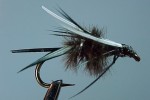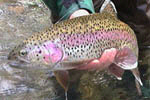|
It was a warm
autumn afternoon on a small, nameless river in British Columbia. One
of those golden days that highlight the calendars of your mind. I
was fishing in shorts and slowly making my way upstream, catching
and releasing Westslope cutthroats every few minutes. Most of the
fish were in the 12- to 15-inch range; but every once in a while Iíd
nail a bigger one, but not so big that I couldnít handle it with my
6 Ĺ-ft. 3-weight rod.
The only thing disturbing my solitude
was a general feeling of discomfort due to the local bear alert. The
area I was fishing has one
of the highest concentrations of grizzlies in North America. Guides
and fishermen had already related stories to me about their recent
bear confrontations. A dry year and a lack of berries had the bears
on the prowl, and the guides were running into them regularly.
They said the best defense was to
nail the bears between the eyes with pepper spray. They said they
did that when the bears were at a distance of ten to fifteen feet.
According to the guides, that would make the bears wet themselves
and run away. I can tell you I would have been the one to wet myself
if a grizzly came that close.
So every time there was a rustle
in the leaves or a twig snapping in the woods behind me, the hair on
the back of my neck would come to attention and a feeling of
impending doom would come over me.
But the fishing was great and you
know how that is. Fortunately, my only visitors were deer and a few
black bear; and, most of the time, black bears wonít bother you.
However, sometimes even the neighborís dog will bite you.
Overall, the scenery was
breathtaking, the fishing good, life was great and problems of the
modern world were far away. The real reasons we fish.
Two other angling buddies were
spread out over the stream, probably not more than a quarter mile
from me, but far enough to give each of us plenty of solitude and
elbow room.
Big ugly flies, like Turckís Tarantula and the Chernobyl Ant pictured below, were
taking most of the fish.
Click on the fly for larger image
and recipe.
The cutts were hanging in small
pockets along the bank, so I was wading up stream a few feet out in
the water. I worked my way around a bend in the river and waded to
the head of a foreboding-looking pool where a fast, shallow run
emptied in. I cast up stream and ran the tarantula, then the ant,
down the run and into the pool a number of times with no response,
so I decided to go deep and tied on a Prince
nymph with a small split-shot above it.
(Peter's
note: The Prince is also known as the Brown Forked Tail. There
is a version called the Black Forked Tail which is made with black
ostrich herl and black biots. Don's variation combines
features of both and is pictured below.)

Click on the
fly for a larger image and recipe.
Iím a firm believer that
inviting-looking pools, where you get no hits, are often the home
territory of big fish. So, I just kept drifting the nymph through
the fast water and through the dark of the pool. Just about the time
I was ready to pick up and move on, the line hesitated and made an
unscheduled stop.
I lifted the rod and was fast to
a fish, but not a big one. After a couple spirited runs, I coaxed
the fish over to my net and could see it was a small whitefish,
maybe ten inches long. I leaned over, slipped the net into the
water, then all Hell broke loose. A long, dark shape, about the
length of my arm, made a shark-like rush past my left leg, grabbed
the whitefish and headed downstream.
It scared the Hell out of me and
I said a few things that would burn the hair off a grizzly, like
"Holy Dingleberries" or something like that. Line melted off my reel
and the little rod looked like a shepherdís crook. This obviously
wasnít a cutthroat.
The fish finally came to a stop
at the foot of the pool, reluctant to leave the safety of the deeper
water. Lucky for me, because there was no way I could have stopped
the fish if it had it decided to leave home.
Then, the fish anchored itself
there at the foot of the pool. To get below the fish, I stumbled
along the stream bank, tripping over rocks, in my best imitation of
a twenty-yard limp, then applied pressure to try to get the fish to
move back up stream. Nothing! The fish refused to move.
I applied more pressure, tweaked
the line like a guitar string and the fish began to move again, this
time upstream. I wasnít so sure I was happy. Did I have the fish or
did the fish have me? If the fish had decided not to move, I would
still be standing in that river in British Columbia. Fortunately,
the fish began sprinting around the pool like a greyhound after a
rabbit. I just hung on.
After another five minutes of rod
pumping excitement, I finally got the fish close enough for me to
get an enlightening look. It was a bull trout. A big nasty bull
trout. (Bull trout have notorious appetites and are known for their
carnivorous ways. They much prefer other fish over insects.)
Now, all I had to do was figure
out how to get an arm-sized fish into my midget-sized net.
(Normally, I donít net large fish. I leave them in the water, slide
my hand down the leader and tippet and just twist the hook out of
their mouths. Sometimes that results in a bent hook, but this time I
was concerned about my fingers rather than the fly. A bull troutís
teeth can constitute a lethal weapon.)
I took me another five minutes
before I finally worked the trout in close enough to consider ending
the fight. There was no way I could get more than half the fish in
the net, but figured I could use my forceps, reach into the water,
grab the fly and release the fish before it could make a meal out of
my hand.
As the fish swung across in front
of me, I slipped the net into the water, tucked the rod under my arm
and reached down with the forceps. Just as I began to feel for the
fly, that big, nasty bull trout just opened its mouth, spit out the
whitefish and swam slowly away.
I NEVER HAD THAT FISH HOOKED.
Throughout the entire fight, the bull trout had just been hanging on
to the whitefish refusing to release it to me and my little, sissy
rod. Turns out that grizzly bears arenít the only carnivores in
British Columbia. Does this mean I now have to tie ten-inch flies
and use pepper spray on the fish?
--Don Shaw |



